-
ECHO הד’ (Amikam Kovner, Assaf Snir 2018)
AMIKAM KOVNER, ASSAF SNIR: ECHO הד’ /HED (2018)
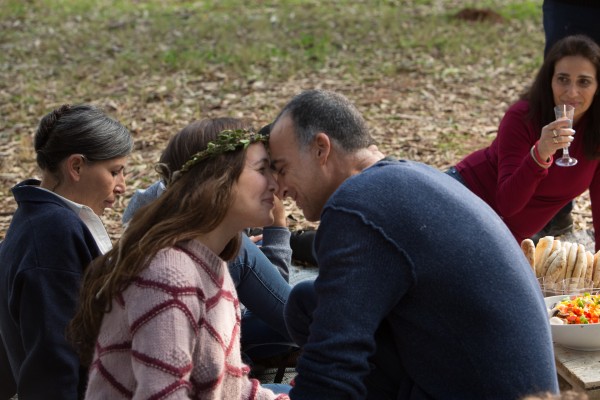
YAËL ABERCASSIS AND YORAM TOLEDANO IN ECHO
Home surveillance
In this Israeli film with a "noirish tone" (Hannah Brown in The Jerusalem Post) set in Haifa, Avner (Yoram Toledano), a chief engineer on the Carmel Tunnels project, discovers through a traffic report with a photo that his wife Ella (Yaël Abecassis), a shrink, may be having an affair.
Rather than confronting her, he spies on her by recording her phone conversations. As he listens over and over to these recordings, more and more - the movie wants to tell us - he comes to find his wife a stranger, their relationship a mystery. A Hebrew comment on Letterboxd says "A lot of genre, but it's a great movie." Regretfully, I must disagree. It's not enough genre, and despite interesting ingredients, doesn't generate sufficient excitement and winds up feeling flat. When Avner tells his two kids he has been "very angry" at their mother we realize we didn't feel that anger. He has to tell us, and he's telling us too late.
The directing team, who were working together for the first time, say they were inspired by Hitchcock's Vertigo, Coppola's The Conversation, and Kieslowski's Red. Excactly the trouble is that they're playing with a few too many ingredients, and the dish they've served up hasn't the strong clear, satisfying taste of that rare thing, neo-noir. "Noirish" it is, but that winds up being like slightly pregnant.
The opening shot is pointed and suggestive: a tunnel, one of the ones on the underground traffic shortcut network Avner is working on, and an explosion. It's a punchy intro. A little bit obvious, of course: Avner is going to be tunneling into the secrets of his marriage, and he's going to take apart its security and its structure forever. He is - spoiler alert - going to find out who his wife Ella was having an affair with. But she has disappeared from the action halfway through, muting the tensions. (This situation may have taken a hint by the Israeli film The Cakemaker by Ofir Raul Graizer, with its jointly aggrieved spouse and secret lover.)
Nothing about the phone conversations Avner records particularly stands out, not do they, like Coppola's film, have a quality of unfolding mystery. But he does do detective work, with some plausibility unraveling the chain of events that led Ella to meet the other man a little over a year earlier. Only the unfolding of this lacks the sense of drama and danger that accompany real noir.
The contrast between the steely, macho Abecassis (a cross between George Clooney and Boris Karloff) and the soft, unassertive Guri Alfi who plays the lover, hints at a pulpy effectiveness. The movie presents its upper middle class milieu suavely. The posh modern apartments, the glamorous birthday picnic, the roughhousing at the gym and Avner's anger at his sexy young coworker-pal Shay (Tsahi Halevi) when he advocates serial adultery. The key subplot of Ella's lost patient and his senile mother in care; the misconceptions of the cute, well brought up kids, Tali (Ron Zimmerman) and Dafna (Tamar Zur). The subtle widescreen images, equally glamorizing landscape and interior. This is sophisticated filmmaking with a consistently polished surface. But it lacks an edge, even a muted scream. It has so many possibilities, but it winds up disappointing.
Echo/ הד’ (Hed), 92 mins., debuted at Jerusalem July 2018, and is showing at 19 Jewish film festivals. It was screened for this review at the San Francisco one.
SFJFF showtimes:
Friday July 19, 2019 3:40 at the Castro
Mon. July 33 8:30 at CineArts
Sat. July 27 8:50 at Albany Twin
Last edited by Chris Knipp; 07-18-2019 at 12:30 PM.
-
ABE (Fernando Grostein Andrade 2019)
FERNANDO GROSTEIN ANDRADE: ABE (2019)
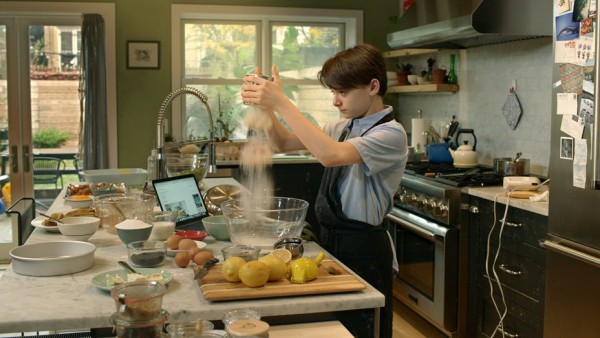
NOAH SCHNAPP IN ABE
Mixed cuisine
If you are not too demanding, this Sundance film may provide charming entertainment. But the trouble with it is that while geared ostensibly to youthful audiences, it contains political conflicts too bitter and intense to be pleasant or understandable for them, while the rest of the content is too simplistic for adults. The idea is reconciliation of family differences through cooking.
Noah Schnapp, "Will" in the series "Stranger Things," has sweetness, earnestness and charm in the lead role of one of those budding boy genius chef types who are popping up all over now. Flynn McGarry of the documentary Chef Flynn was about this age, just turned twelve, when he started his at-home subscription supper clubs. Abe, aka Abraham, Avi, Avram, or Ibrahim, isn't quite that ambitious yet. But when his parents try to send him to a Mickey Mouse summer cooking class for kids, he runs off and begs Chico (musician turned actor Seu Jorge), an Afro-Brazilian fusion chef, to mentor him. The apprenticeship segment is the film's simplest and best, when Abe has to wash pots and pans and put out the garbage, then gradually has his talent recognized and is granted an official apron.
The danger is that this will be construed as child labor, or something, or simply that, out of character, Abe is lying to his parents and doing this in secret.
Abe is a fusion dish himself. His father is Palestinian, his mother Israeli, and their Brooklyn household is frequently visited by all four in-laws. And they don't get along whenever politics is mentioned, which it is whenever they sit down together. Abe's effort to do a Jewish-Arab cuisine fusion meal for Thanksgiving, with a roast turkey which is neither, is such a diplomatic nightmare among parents and in-laws he runs away to Chico, and the stress of his disappearance unites the family's two sides. It's all very emotional and cute - and manipulative and fake. The versatile character actor Mark Margolis of "Breaking Bad" stands out as Benjamin, the macho Israeli grandad, who wants only for Abe to have his bar mitzvah and be an observant Jew. The boy's Palestinian-American father Amir (Arian Moayed) is an atheist. One feels for a kid pulled in so many conflicting religio-ethnic directions. But the treatment of this situation isn't realistic or specific enough to take seriously, even though the one big mealtime fight is disturbingly bitter.
I noticed that Josiah Hughes of Exclaim.ca finds the "online" visuals, meant to be trendy, used to depict on screen Abe's Internet food researches "through a series of zany hashtags, Impact-font memes and Tumblr notifications" is really retro, "the sort of outdated web interfaces that suggest Andrade [the director] "hasn't seen the internet since 2011." I simply saw them as annoying, as it always is when a film throws a mass of barely legible on screen crap at us to "read," when we actually can't.
The point of this stuff is valid though: to show how today's middle class American kid lives a life of Facebook and Tumblr and Tweets, when temporary "grounding" deprivation from his smartphone and laptop is worse than observing Ramadan. Abe admits he has few real friends, only online ones. Unfortunately whether or not ABe's web navigations are up to date, the massive amount of food porn fails to pay off, because the cuisine is too eclectic to be readable, or look appetizing.
Another aspect that eluded me is the music. Joe Bendel of of the movie review blog J.B.Spins knowledgeably lists the rich variety of Brazilian pieces that provide the soundtrack, including cast member Seu Jorge doing several songs, including one by the late Caetano Veloso, plus Tulipa Ruiz doing a number, and the film's "musical supervisor" Jaques Mandelbaum doing cello arrangements of Jobim. In the context I can't agree with Bendel that these "sound fantastic" because they wind up sounding schmaltzy, a part of the film's effort to manipulate our emotions. This, plus the various interesting actors, are indications that there are good materials here, waiting to be edited into a more effective whole.
Abe, 85 mins., debuted January 2019 at Sundance, playing also at Montclair. This is the 38-year-old Brazilian-born director's feature debut. The screenplay was penned by Arab-American theater director Lameece Issaq. It was screened for this review as part of the SFJFF.
SFJFF showtimes:
Saturday July 20, 2019 11:15 am Castro
Sun., July 28 11 am Albany Twin
TRAILER
Last edited by Chris Knipp; 07-20-2019 at 01:08 AM.
-
SAFE SPACES (Daniel Schechter 2019)
DANIEL SCHECHTER: SAFE SPACES (2019)
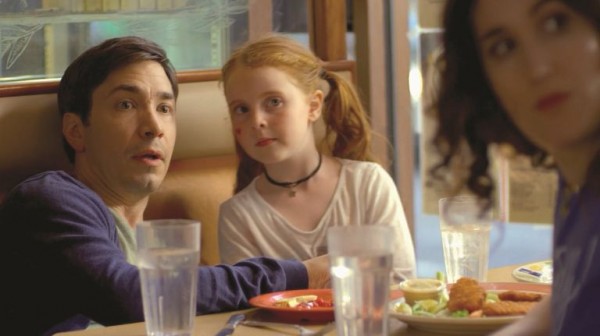
JUSTIN LONG (LEFT) IN SAFE SPACES
Plea for compassion - but what about taste?
A jejune but eager, up to date, and assertive "writing" teacher called Josh Cohen (Justin Long) who the festival blurb calls "a 38-year-old Brooklyn man-child" is an adjunct creative writing professor in New York City who tells a girl student in class to "write what hurts," which in this case turns out to be to describe a date where the boy asked her to let him jerk off on her butt and she did. The premise and scenes feel like the hip HBO anthology series "High Maintenance" except this is about a subject that's become trite of late: political correctness. While everybody uses foul language - college students in front of teachers in class, adult children in front of elders in a hospital - a writing student is criticized for including no people of color in a story that's about his Jewish summer camp. Well, there could be people of color at the camp, as employees. If an African American might be tricky, Josh suggests in private the student might try an Asian. In a smaller, seminar-style class, we learn from a militant African American woman student that for her, "hashtag" and "me too" take on a special, inferior meaning: she uses them to refer to a white male's feeble efforts to be politically correct.
The issue of "appropriate speech" is tossed around, as Josh is repeatedly hauled in to a faculty committee to rehash his discussion of the jack-off moment and the girl's objection that Josh's pressing the girl student to reveal it awakened painful memories of a sexually abusive experience of hers. Josh makes the situation worse for himself by refusing to apologize. Does anyone consider that, first of all, you can't really teach writing and second, Josh gives no evidence of knowing anything about this art? He is only seen, and then only briefly, discussing content, not the quality of writing itself. Can he put a sentence together? Does style matter to anybody? You can't teach people how to write, and you certainly can't teach them style.
But while the issue of the campus and the eggshells teachers walk on is a running theme, the screenplay spends more time on the squabbling New York Jewish family to which Josh belongs as the "boy" who can no longer justify acting so childish. It's not funny anymore, as his brother David (Michael Godere) tells him. Most the the movie is domestic drama about siblings and parents. A grandmother (Lynn Cohen) is in the hospital. First she wants to die. Then she rallies and declares her willingness to undergo radiation, use her walker, and forge ahead. Meanwhile under the tutelage of Josh's hellish mother Diane (Fran Drescher), the grandmother's, her mother's, property gets divided up or dispersed, with her still alive. She's not in a very safe space, evidently. Is this funny? Perhaps it's realistic, and grandma's not really going to last very long.
It's a pleasure to encounter Richard Schiff, a mainstay of the Aaron Sorkin series "The West Wing," as Josh's father. He makes his initially minor role seem important because his line delivery is caustic and felt. Instead of the flailing improvisational manner we get from some of the other cast members, Schiff makes his words pointed. Other characters, like his wife Sherry (Dana Eskelson), or their hostile little son Ben (Tyler Wladis), are reduced to gestures, and even Schiff can't save a schmaltzy death scene. They do show up en masse for grandma's final hours, though. This family fights like cats and dogs. It's not pretty - or funny - and that may make it hard to care about them; the added-on treacle doesn't help. This is not unusual, though, perhaps not really all that bad. But it reads like a quite conventional domestic drama that has gotten hashtag campus politics tacked onto it to make it seem more contemporary.
Safe Spaces debuted at Tribeca April 2019; it was Reviewed there by Alison Crist for Hollywood Reporter. It also showed at Monclair and Woods Hole, and was screened for this review as part of the SFJFF.
SFJFF Showtimes;
Saturday July 20, 2019 8:50 at the Castro
Sun., July 21 6:10 at CineArts; Wed. July 31 8:30 pm Albany
Sunday August 4, 6:30 p.m. San Rafael.
Last edited by Chris Knipp; 09-02-2019 at 10:11 PM.
-
IT MUST SCHWING! THE BLUE NOTE STORY (Eric Frieler 2018)
ERIC FRIEDLER: IT MUST SCHWING! THE BLUE NOTE STORY (2018)

FRANCIS "FRANK" WOLFF AND ALFRED LION
A stunning German recreation of the world of Blue Note Records
There was a movie about this subject last year, Sophie Huber's 2018 Blue Note Records: Beyond the Notes. It's an interesting, well-made film about this key jazz record label and the pair of German Jewish immigrants, Alfred Lion, Francis Wolff, behind it. But you won't ask why there should be another film so soon when you see this one.
This is a bigger production and a German one, executive produced by Wim Wenders and directed by the major German documentary filmmaker, Eric Friedler. The result is a rich experience. There is a parade of jazz greats, just about anyone still living who recorded during the glory days from 1939 to 1965. Beyond that, there are the visuals. The script by Silke Schütze and the director Eric Friedler called for thirty minutes of animation to bring lost moments of Alfred and Frank's world in Germany and America to life. These are done in an original way that's stylized but fairly realistic. Toward the end there is a sequence of really snappy, gorgeous animation showing how the graphics of some of the classic Blue Note album covers are put together: it's a delight to the eye. The constant excerpts of key recordings alternate with the eye candy of the special visuals while the voices of jazz greats like Sonny Rollins, Herbie Hancock, Lou Donaldson, and Wayne Shorter, alternating with narration by several jazz historians, tell us what Blue Note was like. It's an impressive mix, and beautifully organized.
It was like a family. Frank and Alfred treated their African American musicians, victims of racism, with kindness because they were themselves refugees from extreme persecution. We hear at length about the recording sessions, very late at night, the drinks and sandwiches provided for all sessions, the taxis later to New Jersey to Rudy van Gelder's recording studio, the unique respect, and in the Sixties, the way Blue Note played a part in the civil rights movement. Alfred and Frank were always crusaders for civil rights. They valued their musicians. They also focused on modern jazz, not the retro stuff, and they let the musicians play what they wanted to play - though indeed, always there, paying attention, dancing a silly little off-beat jiggly dance (noted in the other film) when happy, insisted when they were not that the piece should be played again, because it "must schwing."
Each talking head contribution is in itself a portrait of the artist. It's extraordinary to hear at length from Sheila Jordan, a key jazz vocalist who is not 90, and still looks really good, hair and makeup immaculate. It's a little surprising that Ron Carter, the stellar bassist who has had a million recording dates, is still angry at the prejudice he experienced. Wayne Shorter, so enigmatic and sad as a player, is bubbly and full of smiles in speech. Rudy van Telder, 91, is giving his last interview. Lou Donaldson, 92, provides an essential running narrative in his high-pitched voice.
When Monk came along, it's acknowledged that he represented genius, and time is taken to listen to him and talk about him and watch him at work, including the spinning.
The film takes time to talk about too many individual recordings and artists to note here. One that stands out is perhaps their earlierst hit, Sidney Bechet's "Summertime," signaled as music whose soulful sweetness still resonates today. Of Blue Note's 1000 record albums, it's been said that 750 are classics. A lot of attention is paid to the distinctive Blue Note recorded sound and of the evolution of the recording studio, and the uniquely positive atmosphere Frank and Alfred maintained.
Pretty much any major jazz performer in the early years not included in this group who talk on camera simply isn't around anymore. Missing giants include John Coltrane, Monk, bebop keyboard pioneer Bud Powell, Art Blakey, Clifford Brown, Miles Davis, Joe Henderson and Jackie McLean. But we hear about them, especially Thelonius (who, we are reminded, nobody called that: he was "Bubba").
Another unique aspect of this film is its featuring of copious dialogue in German, both Alfred speaking and German announcers in New York broadcasting in the Thirties to Germany. It's stressed that both Alfred and Frank came from a part of the German Jewish population who considered themselves far more German than Jewish, in fact hardly Jewish at all, because they were not religious or particularly ethnic, and were very imbued with a sense of their German culture. (Neither of them ever lost his heavy German accent.) Alfred's England-based nephew points out his uncle's sense of Germanness. Perhaps this is a reason why Frank delayed a couple years coming to New York even though the Nazi scourge was clear. Frank was a photographer, had been from when the two met and became friends at the age of 16, and Frank and Alfred both loved jazz when the met, too.
This film talks more about Alfred as the one who ran the business till his retirement forced by ill health. But it delves further into the reclusive, private personality of Frank, giving numerous descriptions of what he was like by the musicians and revealing his black girlfriend even Alfred hadn't know of, who was present at his funeral with her children. The film warmly recreates the pair throughout in the animations, and presents interviews with both Alfred's wives. This, like the previous film, talks about Frank's omnipresent photo-making at recording sessions and at other odd moments. The film is full of Frank's striking black and white stills of the musicians making music, which make the essential part of some of the best of the albums. The other film shows a lot of the album covers too, but this one has the graphic animation of covers that is so dazzling and delightful.
In fact, it's hard to think of anything that could be better in this film, except sitting all day and listening to Blue Note Albums on a classic hi-fi record player. This is one of the best films about jazz in a while.
It Must Schwing: The Blue Note Story, 115 mins., debuted at Munich July 2018; also played at Telluride and Warsaw. It was screened for this review as part of the SFJFF. Jazz fans, don't miss it!
SFJFF showtimes:
Saturday July 20 1:15 Castro Theater
Tues., July 23 12:30 CineArts
Sat. July 28 1 pm Albany twin
FILM WEBSITE
TRAILER
Last edited by Chris Knipp; 07-19-2019 at 04:25 PM.
-
LEONA (Isaac Cherem 2018)
ISAAC CHEREM: LEONA (2018) CAPSULE
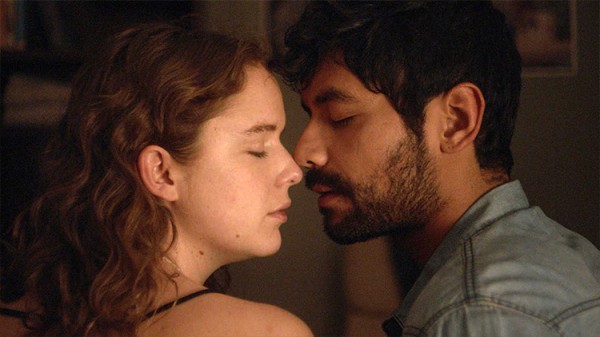
NAIAN GONZÁLEZ NORVIND, CHISTIAN VAZQUEZ IN LEIONA
Capsule review
Ariela (the disarmingly open Naian González Norvind, who co-scripted), is a 25-year-old Mexico City muralist from an observant, upper middle class Jewish family who falls in love (secretly, but not for long) with Iván (Christian Vazquez) an attractive, artistic non-Jewish man with whom she feels a lot in common. Her community is not amused. This film treats in specific detail a subject the outside world doesn't hear about. The 26-year-old director knows whereof he speaks, and the inbred M.C. Jewish community reportedly has not reacted favorably to this film. These people are very well off. Why must their society be so closed? Because, we're told, they came here 100 years ago, refugees from Syria, with nothing, and built it all up by rigid cooperation. In ghettos and shtetls, Jews were once inbred by necessity. Here and now they are so by choice. Assimilation into the goy world by a young woman isn't tolerated by this society, whose marriage and family rules seem more 19th than 21st century. Ariela must be a leona, a lioness: but she may not be up to it. A quiet shocker that mixes romance and ethnography.
Leona, 95 mins., debuted Oct. 2018 at Morelia (Michoacán, México) and has played at 16 Jewish Film Festivals plus the SFJFF, where it was screened for this capsule review.
SFJFF showtimes:
Sunday, July 21 8:45 pm CineArts
Wed. July 24 4:15 pm Castro
Sat. Aug 3, 6:35 pm Piedmont Theater
Sun., Aug 4 8:45 pm Smith Rafael
Best review I've seen is in Spanish by Alejandro Jiménez on Letterboxd.
Last edited by Chris Knipp; 07-21-2019 at 10:10 AM.
-
THE TOBACCONIST/DER TRAFIKANT (Nicolaus Leytner 2018) CAPSULE
NIKOLAUS LEYTNER: THE TOBACCONIST/DER TRAFIKANT (2018) CAPSULE
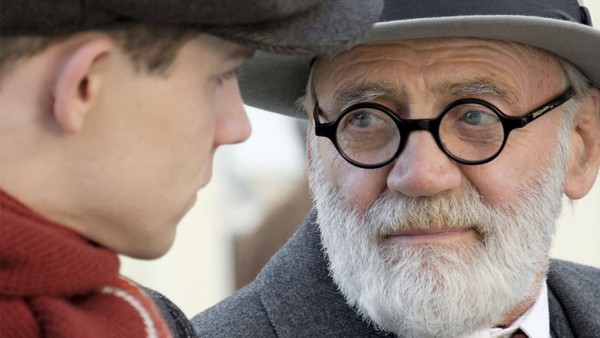
SIMON MORZÉ AND BRUNO GANZ IN THE TOBACCONIST
CAPSULE review - theatrical release coming soon
". . . a stunning recreation of the late 1930s in Vienna, thanks to the talents of director Nikolaus Leytner, his cinematographer and art director. The film expertly captures the tensions in the Austrian capital on the eve of Hitler’s takeover, and it also manages to be a vibrant coming-of-age story and an intriguing portrayal of Sigmund Freud, expertly portrayed by Bruno Ganz." - Stephen Farber, Hollywood Reporter.
In the first shot 17-year-old Frantz Huchel (robust young Everyman Simon Morzé) is hiding underwater in the lake as a thunderstorm rages, the water seemingly a safe cocoon for him. Out in the storm his promiscuous mother's latest lover, post copulation, takes a dip and is destroyed by lightening. Deprived of this source of livelihood, Mom sends Frantz to Vienna to apprentice to another lover, the tobacconist and one-legged WWI vet Otto Trsnjek (Johannes Krisch). Franz enters a miniature storybook world of Thirties shopkeeping, complete with period pornography hidden in a drawer for certain customers, all newspapers save the Nazi one, and a box of the best Havana cigars for the most special customers. Frantz sleeps in the shop, Otto at an apartment elsewhere.
The best touch in this atmospheric and visually pleasing but intellectually lightweight film (its YA storyline is never a total washout but sometimes belies its satisfying mise-en-scčne) is what happens to Frantz at the end, as officials and bullies advise him to go back home but the future doesn't look rosy anywhere. He simply disappears, and the movie fades to black. Freud is gone, the shop has been closed, the Gestapo has the keys, the box of Havana cigars is left behind. The cozy, delightful mise-en-scčne is plastered over with swastikas. What's left? Only tuneful credits roll. And credit is indeed deserved for dp Hermann Dunzendorfer and especially for production designer Bertram Reiter.
The Tobacconist/Der Trafikant, 117 mins., debuted at Hamburg Sept. 30, 2018 and had its US premiere in Jan. 2019 at the NYJFF at Lincoln Center, showing in numerous other Jewish film festivals including the SFJFF, where it was screened for this review.
SFJFF showtimes:
Tuesday July 23, 2019 8:10 p.m. CineArts
Thursday July 25, 2019 8:55 p.m. Castro Theatre
Saturday August 3, 2019 1:35 p.m. Smith Rafael
Sunday August 4, 2019 6:15 p.m. Piedmont Theatre
Last edited by Chris Knipp; 07-25-2019 at 10:11 AM.
-
TEL AVIV ON FIRE (Sameh Zoabi 2018)
SAMEH ZOABI: TEL AVIV ON FIRE (2018) CAPSULE
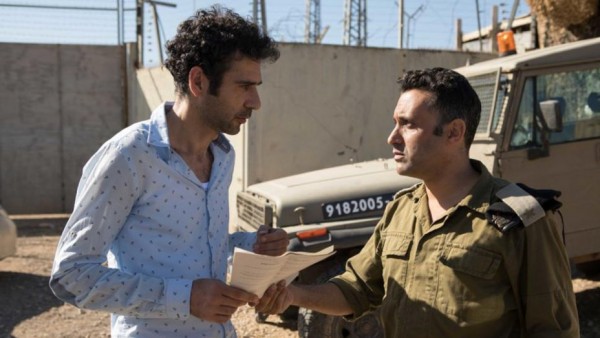
KAIS NASHIF AND YANIF BITON IN TEL AVIV ON FIRE
Israeli and Arab meet over a soap opera
The comedy follows Salam (Kais Nashif of Hany Abou-Assad's tense 2005 thriller Paradise Now), a scrawny Palestinian loser who gets successful as writer for a 1967-set Palestinian TV soap with a female spy, a terrorist, and an Israeli general when an unlikely alliance develops between him and an Israeli checkpoint officer (Yanif Biton) who wants to manipulate the action to please his wife: the show is a hit with Israeli as well as Arab audiences. The film plays with writers constantly changing endings and adding far-fetched twists, and is as silly as the soap it encompasses. But it takes us to a fanciful, less grim occupied land where Arabs and Jews mix in the name of silly melodrama. Alas, if Jay Weissberg's Variety review is right, for this film, "Israeli money means Arab play is impossible." As is shown in the film, fantasies of Israeli-Palestinian reconciliation are just that. I came to like the loose-limbed style of Kais Nashif and the way the film feels as thrown-together as the soap it depicts. Director Sameh Zoabi is from a tiny Palestinian town but studied at Colombia and teaches at NYU.
[I]Tel Aviv on Fire[/I تل أبيب على النار], 100 mins., debuted in the Orizzonti section at Venice Sept. 2, 2018 (Best Actor for Kais Nashif) and played at many international film festivals, now in Jewish film festivals, including SFJFF for this review. A limited US release starts July 26, 2019. Now showing at Quad Cinema, Landmark at 57 and the Beekman Theater in NYC. Coming to SF Bay Area: Aug. 9 following at Landmark’s Clay Theatre. San Francisco and Landmark’s Shattuck Cinemas, Berkeley.
Last edited by Chris Knipp; 08-09-2019 at 12:56 AM.
 Posting Permissions
Posting Permissions
- You may not post new threads
- You may not post replies
- You may not post attachments
- You may not edit your posts
-
Forum Rules





 Reply With Quote
Reply With Quote






Bookmarks